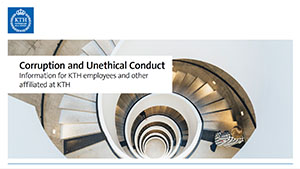About Corruption and Unethical Conduct
What is right and what is wrong? Just because something is permitted or legal does not necessarily mean that it is appropriate or judicious. This booklet will provide support and guidance in this work.
Earning and maintaining trust
Employees of a government agency as well as an institution of higher education face various challenges. According to the Swedish Higher Education Act, we must act in a way that upholds “academic credibility and good research practice”, while our work in public administration must be characterised by “respect for the equal worth of all and the liberty and dignity of the individual”, as stipulated by the Swedish Instrument of Government. In other words, we must show consideration for different value systems that set high standards for sound judgement and an ethical approach to our daily work.
When we apply sound judgement and common sense in our daily work, we protect the trust placed in KTH. It is a precious and fragile asset. A college or university that enjoys the trust of its students, employees, and the outside world can accomplish great things, while a higher education institution that lacks such trust has limited room for manoeuvre.
What is right and what is wrong? Just because something is permitted or legal does not necessarily mean that it is appropriate or judicious. Maintaining a live and ongoing discussion on what does and does not constitute an ethically acceptable behaviour is characteristic of a healthy organisation. An open and transparent environment – internally as well as externally – is another sign of health.
By jointly discussing, engaging in dialogue, and thinking aloud, we create, uphold, and cultivate our ethical awareness. This is essential for trust in KTH in particular, academia in general, and, by extension, for democracy as well.

